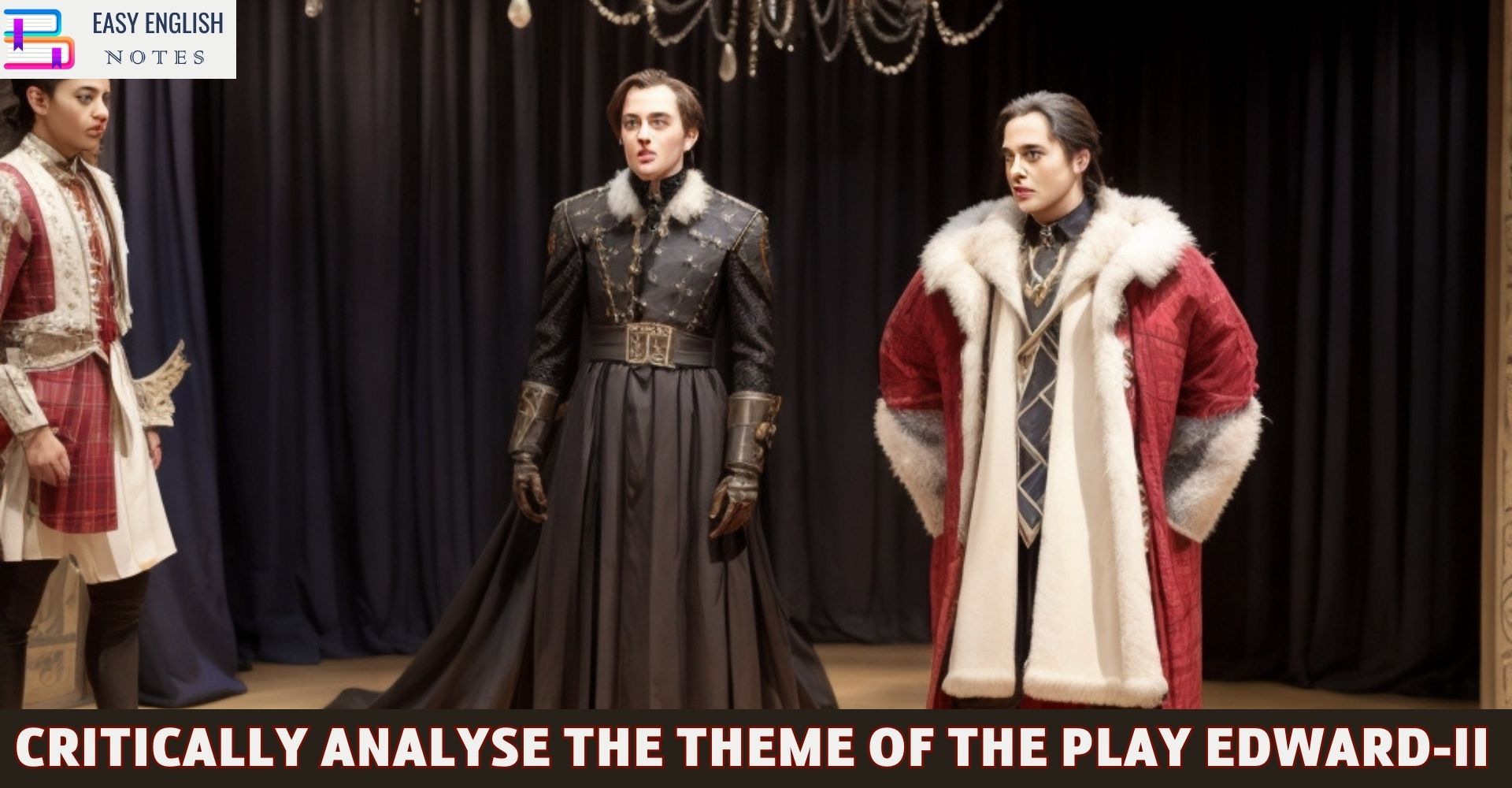Christopher Marlowe’s “Edward II” is a play that offers a rich tapestry of themes, character complexities, and social commentary. While critics have debated the central idea of the play, it is evident that the work goes beyond mere technical excellence to engage with concepts such as power, weakness, humiliation, and the worth of individuals within the context of an evolving society. By delving into the play’s themes and impressions, we gain a deeper understanding of its underlying messages.
Generally there is no any particular idea, or theme in Marlowe’s Edward II. The play may be a remarkable example of the dramatist’s craftsmanship, but technical excellence alone does not make a play great. The central idea or the thematic feeling offers an impression of the play. Critics like Bradbrook and Maxwell do not find a single unifying theme or a single appropriate tone in the play.
But, critics see ‘Friendship’ as the central idea in the play. It is possible that the dramatic effectiveness of Edward II, realised by all readers of the play, may be explained by the drama’s use in the tragedy of the Elizabethan friendship ideas. This is what comes from the search for a single theme, a sense that somewhere there exists the meaning, if only you can find the clues. But if, the incidents of the play are observed more minutely it will be seen that friendship is not essentially the central of the play.
Also Read :
- Compare Hamlet with Macbeth, Othello and other Tragedies
- “The Pardoner’s Tale” is the finest tale of Chaucer
- Prologue to Canterbury Tales – (Short Ques & Ans)
- Confessional Poetry – Definition & meaning
- Line By Line Explanation Of The Poem The Eve of St. Agnes
Edward II may be considered a play of weaknesses, petty considerations, undignified and humiliated personalities. The same idea runs throughout the play. First of all. Edward II is the representative of weak kingship. He is always at fault: he neglects the kingdom, disparages the earls, cruelly insults the queen, and is all the time besotted with his Gaveston. It is these weaknesses that do not make-Edward II a tragic hero. The tragic hero suffers because of a flow in his character. But he has also something good, great or noble in him. He suffers nobly and falls nobly. Tragedy exhibits the greatness or nobility of human soul. But Edward II does not impress as a noble man nobly suffering. He is a blot on kingship: “Was ever king thus overruled as I ?”
Edward’s humiliation is greater than any other character’s in the play. “Indignity here makes its masterpiece. Forcibly shaved, washed in puddle water, confined in darkness and filth. maddened by a beating drum, thrown his food like a dog, denied human contact except with the goalers who ‘taunt and insult him. this king is the very embodiment of humiliated mankind.” His terrible death matches a humiliating life. Throughout the play, except in the brief middle section, Edward is insecure at best and at worst quite impotent in the face of force and insolence. His first line. ‘Will you not grant me this?” presents the pathetic spectacle of a king pleading. Further, to Kent, who speaks moderately, he uses language which would have been better, bestowed on the rebellious nobles: “Cease brother for I cannot Brooke these words’. He rages powerlessly against the power of Rome. When he puts upon the bishop humiliation, he actually foreshadows his own:
Throw off his golden miter, rend his stole, And in the channel Christen him anew,
Likewise, when told of the French invasion of Normandy he dismisses it as a trifle, and he has in fact no interest in his kingdom. With all these weak qualities, he is despised, taunted and crossed:
In Edward II, the impression given is that the worth of the world is in proportion. to the worth of man. “There has always been in Marlowe the sense that the world is less than man. The world is the setting for man; man is the stone in the ring. But the setting cheapens with the jewel. Tamburlaine is great (subjectively) and so is his world; Edward is a poor creature and the world’s worth has decreased proportionately.” The play has a unified impression of the low and ignominious in mankind. This bitter flavour can very well be felt throughout the play. “Edward weakly protesting to his barons, weakly, impotently raging or abjectly and wretchedly submitting. Gaveston’s pathetic strutting before the lords who not only hate but despise him, learning of his banishment, frustrated of his last sight of the king. Mortimer’s petty motivation: his resentful pride, laughed at by the dapper jack, nobility humbled by the upstart. The pricking of the bubble of Isabella’s eloquence: the-humiliating violence offered to the bishop of Coventry: the enforced removal of the protesting queen; and above all the King subject to every indignity, crownless and washed in puddle water. There is surely a unity of love and feeling here.”
In conclusion, “Edward II” may not possess a single unifying theme in the conventional sense, but its themes of weakness, power, humiliation, and societal worth intersect to form a complex exploration of human nature and society. Marlowe’s nuanced character portrayals and vivid depictions of humiliation create a unified impression that resonates with readers and audiences, inviting them to ponder the intricacies of human behavior and the consequences of power and weakness.
PLEASE HELP ME TO REACH 1000 SUBSCRIBER ON MY COOKING YT CHANNEL (CLICK HERE)











